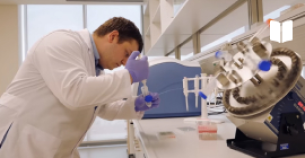The purpose of Acibadem University Health Sciences Institute’s ‘Biochemistry and Molecular Biology’ Doctoral Program is to educate qualified scientists, who have strong team work spirit, questioning, idea production and investigation mentality and who can also contribute to production.
Today, Biochemistry and Molecular Biology are the two fastest developing scientific fields and have substantial effect on sectors such as medicine, pharmacology, agriculture, husbandry, industry and environment globally, as much as in our country. All of the modern biotechnologic products are based on the knowledge at hand about biochemistry and molecular biology.
In this doctoral program, the goal is to teach students cellular and chemical incidents, which are observed at health and sickness, at molecular level. Genetics, signal transduction and metabolic reactions form a grift interaction web that has harmony with the environment. Genetic changes such as mutation and polymorphism, which affect single molecule, have also effect on cellular behaviour besides chemical process. This way, they might have significant effect on the organs’ functions and the organism itself. Because of these reasons, today’s biochemistry involves a wide interdisciplinary web of genomics, proteomics, gene and protein network, as well as lipid, carbohydrate and protein metabolic pathway, cellular communication and signal cascades and also organs’ complex diseases and cardiovascular circulation. And in modern biochemical researches, as parallel to that wide content, advanced techniques such as microarrays, peptides, proteins and mass – spectrometry anlysis of biomolecules are also in use. Students, who attend this doctoral program, will gain experience about clinical and laboratory aspects of biochemical and genetic researches, besides acquisition of wide theoric knowledge about an interdisciplinary program.
As a result, a student, who graduates from this program that aims to educate preemptible researchers in terms of career opportunities and preferability in various areas, will be able to become an academician or a researcher at public or private institutions such as universities and research centers and also will have executive positon opportunities at medical faculties’ and health institutions’ diagnosis and tratment laboratories.
Aysel ÖZPINAR, Prof.
Head



